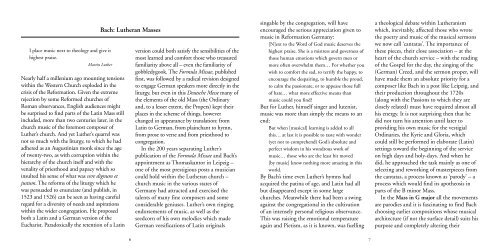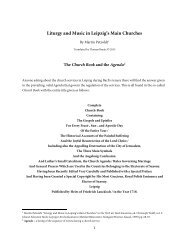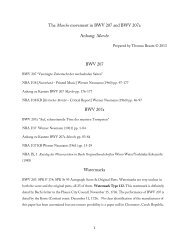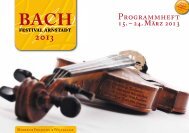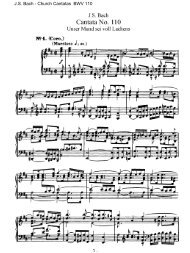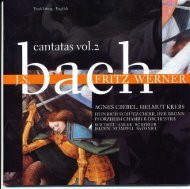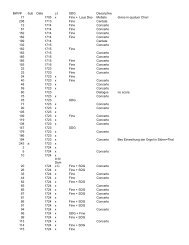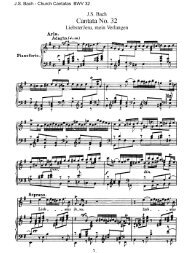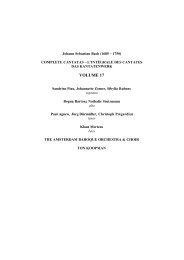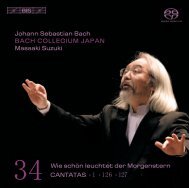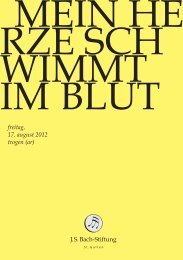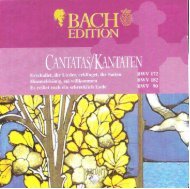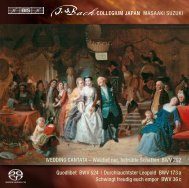Create successful ePaper yourself
Turn your PDF publications into a flip-book with our unique Google optimized e-Paper software.
<strong>CHAN</strong> <strong>0653</strong> BOOK.<strong>qxd</strong> 20/8/07 3:42 pm Page 6<br />
I place music next to theology and give it<br />
highest praise.<br />
Martin Luther<br />
Nearly half a millenium ago mounting tensions<br />
within the Western Church exploded in the<br />
crisis of the Reformation. Given the extreme<br />
rejection by some Reformed churches of<br />
Roman observances, English audiences might<br />
be surprised to find parts of the Latin Mass still<br />
included, more than two centuries later, in the<br />
church music of the foremost composer of<br />
Luther’s church. And yet Luther’s quarrel was<br />
not so much with the liturgy, to which he had<br />
adhered as an Augustinian monk since the age<br />
of twenty-two, as with corruption within the<br />
hierarchy of the church itself and with the<br />
venality of priesthood and papacy which so<br />
insulted his sense of what was vere dignum et<br />
justum. The reforms of the liturgy which he<br />
was persuaded to enunciate (and publish, in<br />
1523 and 1526) can be seen as having careful<br />
regard for a diversity of needs and aspirations<br />
within the wider congregation. He proposed<br />
both a Latin and a German version of the<br />
Eucharist. Paradoxically the retention of a Latin<br />
<strong>Bach</strong>: Lutheran Masses<br />
6<br />
version could both satisfy the sensibilities of the<br />
most learned and comfort those who treasured<br />
familiarity above all – even the familiarity of<br />
gobbledygook. The Formula Missae, published<br />
first, was followed by a radical revision designed<br />
to engage German speakers more directly in the<br />
liturgy, but even in this Deutsche Messe many of<br />
the elements of the old Mass (the Ordinary<br />
and, to a lesser extent, the Propers) kept their<br />
places in the scheme of things, however<br />
changed in appearance by translation: from<br />
Latin to German, from plainchant to hymn,<br />
from prose to verse and from priesthood to<br />
congregation.<br />
In the 200 years separating Luther’s<br />
publication of the Formula Missae and <strong>Bach</strong>’s<br />
appointment as Thomaskantor in Leipzig –<br />
one of the most prestigious posts a musician<br />
could hold within the Lutheran church –<br />
church music in the various states of<br />
Germany had attracted and exercised the<br />
talents of many fine composers and some<br />
considerable geniuses. Luther’s own ringing<br />
endorsements of music, as well as the<br />
seedcorn of his own melodies which made<br />
German versifications of Latin originals<br />
singable by the congregation, will have<br />
encouraged the serious appreciation given to<br />
music in Reformation Germany:<br />
[N]ext to the Word of God music deserves the<br />
highest praise. She is a mistress and governess of<br />
those human emotions which govern men or<br />
more often overwhelm them… For whether you<br />
wish to comfort the sad, to terrify the happy, to<br />
encourage the despairing, to humble the proud,<br />
to calm the passionate, or to appease those full<br />
of hate… what more effective means than<br />
music could you find?<br />
But for Luther, himself singer and lutenist,<br />
music was more than simply the means to an<br />
end:<br />
But when [musical] learning is added to all<br />
this… at last it is possible to taste with wonder<br />
(yet not to comprehend) God’s absolute and<br />
perfect wisdom in his wondrous work of<br />
music… those who are the least bit moved<br />
[by music] know nothing more amazing in this<br />
world.<br />
By <strong>Bach</strong>’s time even Luther’s hymns had<br />
acquired the patina of age, and Latin had all<br />
but disappeared except in some large<br />
churches. Meanwhile there had been a swing<br />
against the congregational in the cultivation<br />
of an intensely personal religious observance.<br />
This was raising the emotional temperature<br />
again and Pietism, as it is known, was fuelling<br />
7<br />
a theological debate within Lutheranism<br />
which, inevitably, affected those who wrote<br />
the poetry and music of the musical sermons<br />
we now call ‘cantatas’. The importance of<br />
these pieces, their close association – at the<br />
heart of the church service – with the reading<br />
of the Gospel for the day, the singing of the<br />
(German) Creed, and the sermon proper, will<br />
have made them an absolute priority for a<br />
composer like <strong>Bach</strong> in a post like Leipzig, and<br />
their production throughout the 1720s<br />
(along with the Passions to which they are<br />
closely related) must have required almost all<br />
his energy. It is not surprising then that he<br />
did not turn his attention until later to<br />
providing his own music for the vestigial<br />
Ordinaries, the Kyrie and Gloria, which<br />
could still be performed in elaborate (Latin)<br />
settings toward the beginning of the service<br />
on high days and holy-days. And when he<br />
did, he approached the task mainly as one of<br />
selecting and reworking of masterpieces from<br />
the cantatas, a process known as ‘parody’ – a<br />
process which would find its apotheosis in<br />
parts of the B minor Mass.<br />
In the Mass in G major all the movements<br />
are parodies and it is fascinating to find <strong>Bach</strong><br />
choosing earlier compositions whose musical<br />
architecture (if not the surface detail) suits his<br />
purpose and completely altering their


